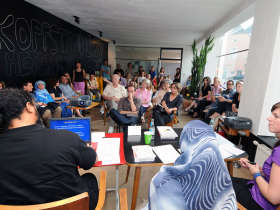Kopfstand 09: Heterogeneous Islam

Linz09’s latest Kopfstand event spent a full evening focusing on Islam. In spite of extensive media coverage of this topic, many people in this country still bring misunderstandings and prejudices to their encounters with Islam, and few have really well-grounded knowledge of its religion, culture and philosophy. This 13th installment in the Kopfstand series aimed to do something about that. And, indeed, the turnout in transpublic in downtown Linz was excellent.
Islamic DiversityThere are 1.5 billion Muslims worldwide living in many states across three continents. The two main divisions are Shiites and Sunnis, with the latter further subdivided into Hanafites, Malikites, Hanbalites and Shafiites. “Nevertheless, a tendency to regard Islam as a unified entity prevails in discussions in the mass media,” stated Moussa Al-Hassan. The speakers at this Kopfstand get-together elaborated on Islam’s various legal schools of thought and its many national and regional varieties. They also discussed the situation of Muslims in Austria and in Linz. “Austria has earned high regard worldwide for its successful model for dealing with Islam. Here, Muslims have the right to practice their religion freely and openly, a right that stems from legislation enacted in 1912,” Amina Baghajati emphasized.
Muslims in Linz
Muslims make up 7% of the population of Linz. Most are originally from Bosnia-Herzegovina, Albania, Kosovo and Turkey. “Their religious ways are just as diverse as their ethnic heritage. But they have one thing in common: They are organized in associations on which their religious and social life is centered,” according to Moussa Al-Hassan. And no less diverse than the world of Islam itself were the questions posed by the audience during the discussion that followed the speakers’ remarks. Attendees were particularly interested in the current state of the Islamic cultural center project in Linz-Kleinmünchen, the position of minorities, the development of science and the role of women in Islam, as well as how Islam is being taught in Austrian schools.
Detailed information about Islam is available on the website of the IGGiÖ – The Islamic Religious Community in Austria: www.derislam.at.
Carla Amina Baghajati, a convert to Islam, is the press spokeswoman of the IGGiÖ.
Moussa Al-Hassan is an Islamic religious teacher and co-founder of the initiative for the construction of an Islamic cultural center in Linz.
Nikola Ornig headed the Council of Europe’s “All Different – All Equal” campaign in 2007. She authored the study “The Second Generation and Islam in Austria,” and is currently doing applied social research in Berlin.





